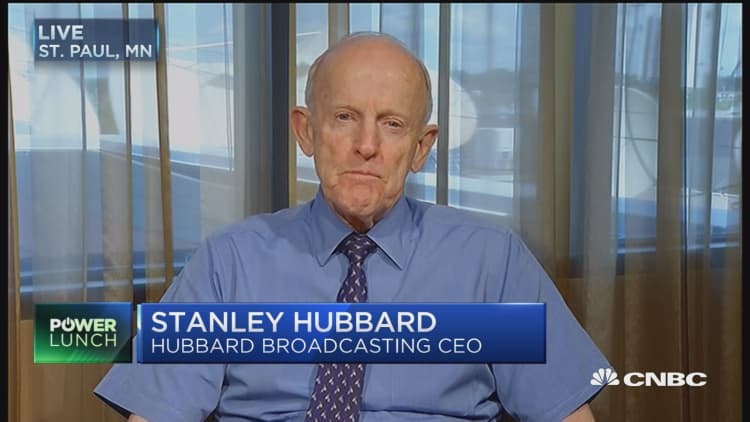



Subdued and speaking deliberately and slowly, Donald Trump on Monday expanded on his plans to curb immigration in response to terrorism, calling for a new "ideological screening test" to vet people coming to the United States.
Stirring concerns about terror attacks both domestic and abroad, the Republican presidential nominee cast himself as qualified to "halt the spread" of extremism. He highlighted his plans to hit the Islamic State terror group with military and cyber efforts, stressing in particular his proposals to screen people coming to the U.S.
"We should only admit into this country those who share our values and respect our people," Trump said at Youngstown State University in Ohio, a key state in November's election.
Trump also criticized his Democratic opponent Hillary Clinton and President Barack Obama, claiming they "unleashed ISIS" with their policies in Iraq and Syria when Clinton was secretary of state. He stayed on the attack, but was more subdued, after he received backlash last week for repeatedly claiming Obama founded ISIS. Trump later said his "sarcasm" was misinterpreted.
Trump's harsh rhetoric and unconventional proposals on combating extremism and limiting acceptance of refugees to the United States helped him stand out in a crowded GOP primary field. But so far, Trump has failed to craft a consistent foreign policy as his poll numbers slide in the general election tilt with Clinton.
On Monday, Trump positioned the fight against ISIS as an ideological battle akin to the Cold War. He called for cyber warfare to hit propaganda efforts online and "extreme, extreme vetting" of immigrants.
Trump said he aims to screen out ISIS sympathizers, people who support bigotry or people who believe Sharia law should supplant American law. It is unclear how those traits would be tested or if the policy would be deemed constitutional.
"In the Cold War, we had an ideological screening test. The time is overdue to develop a new screening test for the threats that we face today. I call it extreme vetting," Trump said.
He also pledged to create a "commission on radical Islam" to "identify and explain" factors that lead to radicalization and craft standards for local police to root out extremism. In a shift, Trump also said he wanted to work with the North Atlantic Treaty Organization, an alliance he previously called obsolete, to root out terrorism.
Some Republican officials and Trump advisors have said the billionaire developer could make up the ground against Clinton if keeps to his policy message. He tried to do so with a scripted economic speech last week, only to shift the attention shortly after by appearing to suggest gun owners could take action to prevent Clinton from appointing Supreme Court justices. He later said he was only calling on them to organize as a voting bloc.
Though he stayed on script Monday, it remains to be seen how long Trump can hold to a prescribed policy discussion. In a CNBC interview Thursday, Trump said he would try to win with his off-the-cuff style. Tweeting this weekend in response to a New York Times story that discussed advisors wanting him to stay on message, Trump contended it would be "dishonest to supporters" for him to change.
Trump's previous proposals on preventing terrorism by extremists embody the pugnacious style that marked his unlikely climb to the GOP nomination. Last year, he suggested a temporary ban on Muslims entering the United States until U.S. officials can better screen travelers.
He later shifted amid widespread criticism, saying he wants to limit immigration from countries with ties to terrorism. On Monday, Trump reiterated that pledge, saying he would work with the State Department to potentially suspend immigration from "some of the most dangerous, volatile regions" where screening may not be adequate.
Experts have said both policies could prove extremely difficult to enforce and may not be effective, as many recent U.S. terror attacks were carried out by people born in the U.S.
Trump has repeatedly attacked Clinton and Obama for supporting the admittance of refugees from Syria, where ISIS has a presence. He has raised eyebrows by saying he wants to bring back waterboarding, a form of torture, and by suggesting the U.S. needs to "take out" terrorists' families as well as the extremists themselves.
In an NBC News/Wall Street Journal poll this month, Clinton and Trump garnered equal support for their ability to handle terrorism. At a rally in Scranton, Pennsylvania earlier Monday, Clinton claimed Trump has been "all over the place" on ISIS policy and lacked a concrete strategy.
She said she would strike "local sanctuaries" from the air and aid local forces fighting ISIS. She also called to fight radicalization efforts on social media and other platforms.


